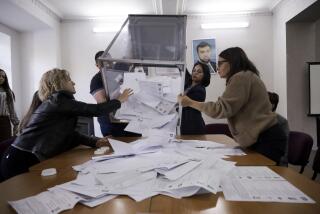Opposition Parties Win Place in Mongolia Cabinet
- Share via
BEIJING — Elections in Communist-ruled Mongolia have given opposition parties nearly 40% of the seats in a key legislative body, according to results released Tuesday.
Communist Party chief Gombojavyn Ochirbat, speaking at a news conference in the Mongolian capital of Ulan Bator, said opposition representatives will be invited to join the new government’s Cabinet. This step is “vital for political stability and national unity,” he said.
With nearly all votes counted from Sunday’s balloting, election officials announced that the Communists had captured 80% of the seats in the 430-member People’s Great Hural, which elects the nation’s president, and about 60% of the seats in the 53-member Small Hural, which is the regularly functioning legislature.
The election results mark “the end of orthodox communism in Mongolia,” Baterdeniyn Batbayar, chairman of the opposition Social Democratic Party, said at a news conference Tuesday.
“For a long time our people were under the exploitation of communism,” Batbayar said. “Now we are just coming from the darkness into a bright future.”
The election law requires seats in the Small Hural to be allocated according to a party preference poll that was on Sunday’s ballot. This procedure helped Mongolia’s fledgling opposition parties, which were legalized only a few months ago, to compete more effectively in the race for this legislative body.
The Mongolian People’s Revolutionary Party, as the Communists are officially known, won 343 seats in the Great Hural, election officials said. The Mongolian Democratic Party won 23 seats, the National Progress Party won 7, the Social Democratic Party won 4 and independents or minor party candidates won 25 seats. New elections may be required in 28 districts, in most cases because no candidate won a majority.
In the party preference poll for the Small Hural, the Mongolian Democratic Party took 24% of the votes, the National Progress Party had 6% and the Social Democratic Party had 5%.
U.S., British and Soviet observers have said the elections seemed basically free and honest, despite some isolated problems. The voting system, however, was weighted in favor of rural residents, who supported the Communists.
The elections, the first free multi-party balloting in Mongolia’s history, climaxed eight months of dramatic political change that began with dissident rallies in December. The Communists, influenced by the wave of political liberalization sweeping Eastern Europe and the Soviet Union, responded with a conciliatory stance.
More to Read
Sign up for Essential California
The most important California stories and recommendations in your inbox every morning.
You may occasionally receive promotional content from the Los Angeles Times.












